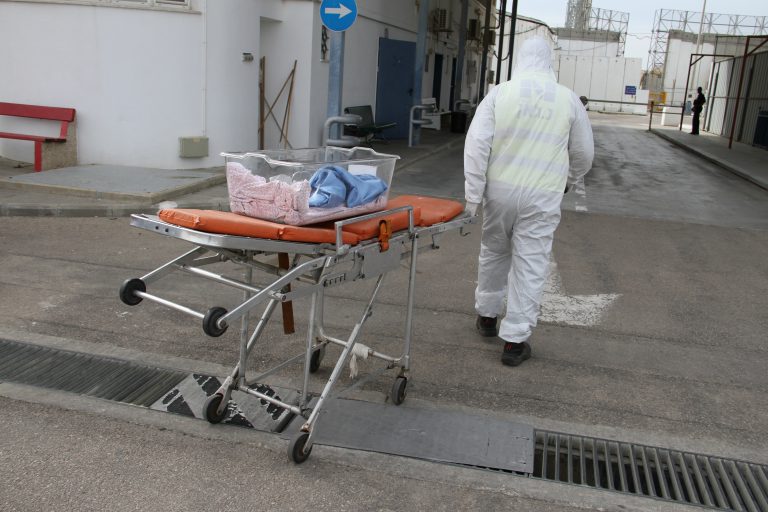29 May 2019, the Israeli authorities finally allowed Hiba Swailam to exit Gaza to pick up her baby daughter, Shahad, from hospital. Shahad had been stranded at Al Makassed hospital in East Jerusalem, receiving treatment without her mother or father, since late 2018. Hiba had given birth to premature triplets at the hospital, but when her permit expired she returned to Gaza, forced to leave her children in the neonatal intensive care unit, as reported by The Guardian. Two of the triplets died a few days later, leaving Shahad alone in the hospital. Shahad’s mother was informed of the two deaths by phone call from the hospital.
Since the beginning of 2018, Al Makassed hospital counted 56 babies separated from their parents during neonatal intensive care treatment. Six of these babies passed away without a parent next to them. Such separations are not only highly distressing for parents, but the lack of contact with their children threatens the attachment bond, critical to a child’s inherent sense of protection and brain development.
The suffering of the Swailam family is only one example of the effects that years of blockade and closure – and Israel’s heavy restrictions to freedom of movement – have had on the right to health of Gaza’s children. Israel’s current medical exit permit regime consists of an intricate, opaque system of reviews and security clearance processes run by the Coordination of Government Activities in the Territories (COGAT) – the Israeli military body responsible for administering the occupation and Gaza closure.
In its recent annual report on the Occupied Palestinian Territory (OPT), the World Health Organization (WHO) stated that in 2018, more than 1,800 children from Gaza travelled outside for medical treatment unaccompanied by a parent due to permit denials and delays.
Many other patients are simply unable to get out of Gaza for treatment at all – to the West Bank, including East Jerusalem, or anywhere else – accompanied or otherwise. The WHO has documented that since 2012, the rate of unsuccessful patient exit permit applications has increased from 8% in 2012 to 39% in 2018. Of all the unsuccessful applications in 2018, 32% concerned children. Unsuccessful applications, either by denial or delay, may have catastrophic consequences.
The death of Aya Khalil Abu Metleq, who was 5 years old and had a metabolic disorder, on 17 April 2017 happened “after her request to exit Gaza for medical treatment in East Jerusalem was denied by Israeli authorities” as reported by Al Mezan. The Israeli authorities failed twice to give an answer to Aya’s family’s request, forcing them to restart the application procedure again – yet in vain, as while awaiting a response to their third attempt to get a permit, Aya’s time ran out and she died.
Israel, as the occupying power, “holds the primary responsibility to respect, protect and fulfil the right to the highest attainable standard of physical and mental health” in the OPT.
Aya was one of 54 Gaza patients who died in 2017 after having to miss medical appointments outside Gaza due to denials or delays by the Israeli authorities. The potentially fatal consequences of the arbitrary Israeli permit system don’t go unnoticed. Human rights organisations regularly challenge COGAT’s decisions. In 2018, Physicians for Human Rights Israel (PHRI) managed to overturn 51% of permit decisions made. This only shows that Israeli security claims are truly arbitrary. Israel ratified the Convention on the Rights of the Child (CRC) in 1991, together with its two Optional Protocols in 2005 and 2008. and the refusal and delays in issuing medical exit permits violate Israel’s obligations under these treaties. Article 24 of the CRC clearly specifies that a state party has primary duties towards children’s right to health.
Although Israel argues the contrary, the Committee on the Rights of the Child has stated multiple times that Israel retains jurisdiction for children in the OPT. The WHO agree with the Committee of the Rights of the Child in that Israel, as the occupying power, “holds the primary responsibility to respect, protect and fulfil the right to the highest attainable standard of physical and mental health” in the OPT. Israel is clearly obligated under international law to facilitate, and not prevent, the access to health of children and all others under its occupation. On the contrary, as UN Special Rapporteur on Human Rights in the OPT has determined, Israel is “in profound breach” of these obligations.
On the Universal Children’s Day, which marks the 30th anniversary of the adoption of the CRC by the UN General Assembly, the unnecessary suffering of children and their families in the hands of this arbitrary and unjust system must be redressed. Otherwise, children will continue to endure one of the highest burdens of Israeli collective punishment inflicted on Gazans by the occupation and closure. Regular and reliable access to health must be made possible including through urgently lifting the illegal closure and blockade of Gaza.


